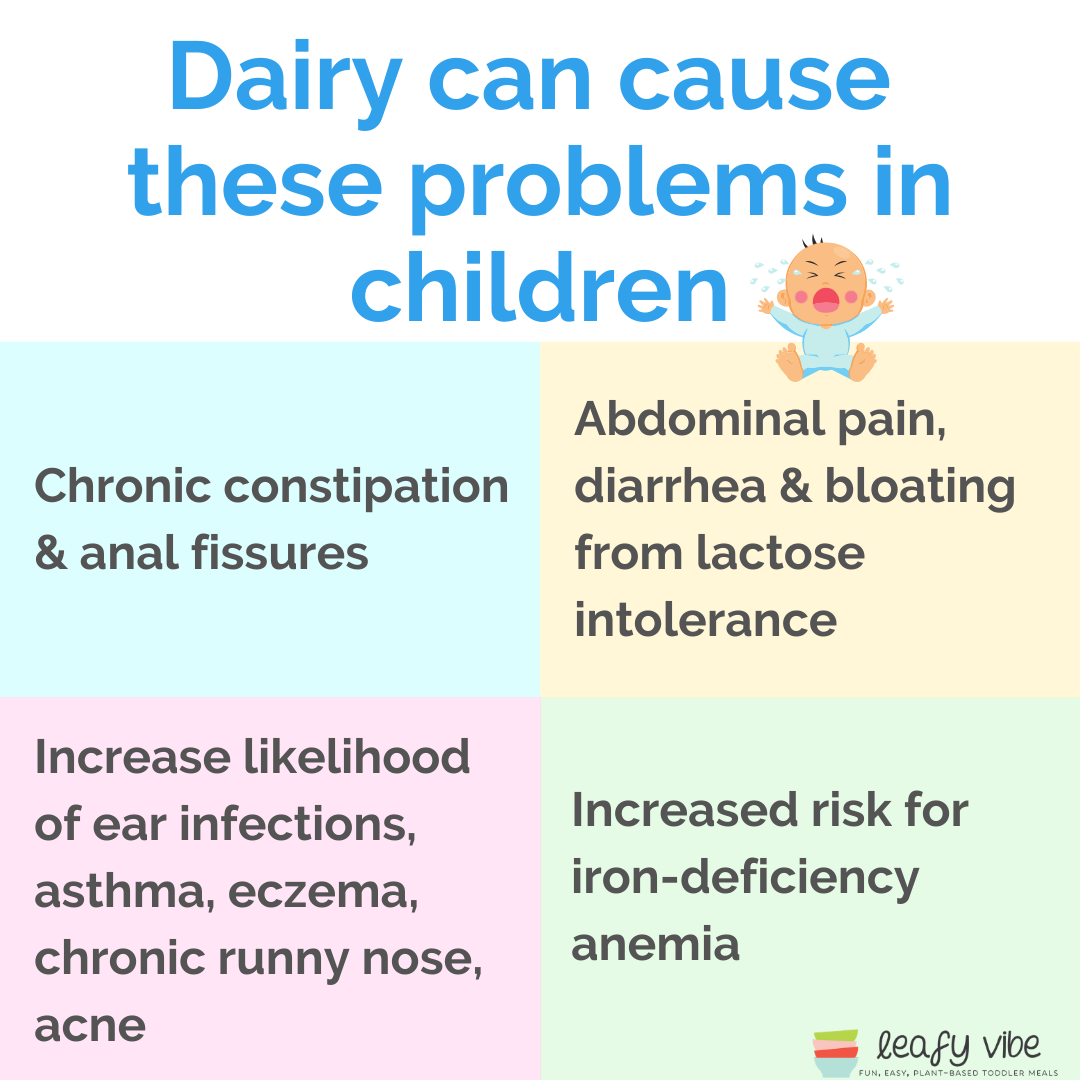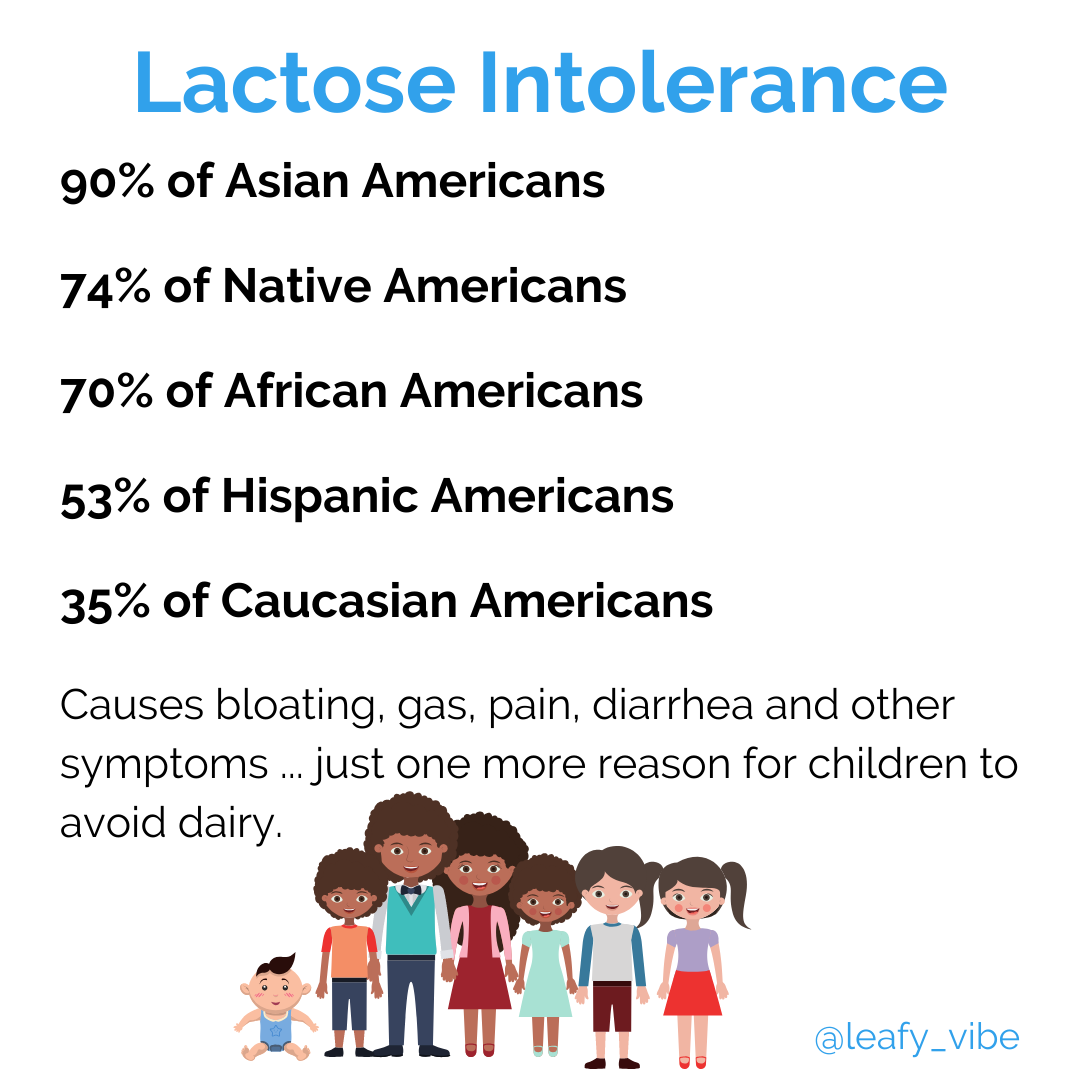6 Reasons Your Child Should be Dairy Free
Toddlers and children do not need cow’s milk.
Dairy is not healthy for children.
The recommendation to give children milk from another species is based on cultural norms, NOT on scientific evidence.
I gave my children dairy for years. But if I knew then what I know now, my kids would have been dairy free from birth.
One of my daughters had severe constipation after weaning from breast to cow's milk. I didn’t know dairy might be causing my toddler’s constipation. As she got a little older, she disliked milk. So when she stopped drinking milk, the constipation resolved almost immediately.
Today we have numerous studies showing cow’s milk causes constipation and anal fissures in many babies, toddlers, and young children.
Related: Help! My Toddler is Constipated
Once a child is weaned from the breast, is at least 12 months old, and is growing and gaining normally, she does not need milk of any kind.
Water should be her main beverage. And the fats and nutrients she needs should come from the foods she eats.
“The harmful effects of a poor diet are invisible...until one day they aren’t.
Which may be a few months, years, or even decades later.
By then, it’s too late.
Habits have been formed.
Damage has been done.”
The effects of a toddler’s diet now will persist into their adulthood tomorrow.
Below are 6 reasons dairy is unhealthy for toddlers and children
1. Dairy causes constipation
Constipation in children is nearly an epidemic in the U.S. I'm a pediatric nurse, and in the clinic, we talk about constipation every day. It's actually one of the top ten problems we get.
Constipation can cause serious problems for children, including pain, rectal bleeding, anal fissures, hemorrhoids, severe abdominal pain and anxiety related to potty training, and even potty training regression.
Cheese consumption is at an all-time high, and as a nation, we’ve tripled the amount of cheese we eat in the last 30 years. (It’s no wonder everyone is constipated.)
Studies show, in most children suffering from chronic constipation, removing all sources of dairy improves and often resolves constipation and all its complications in as little as one week.
Related: Help! My Toddler is Constipated
2. Lactose Intolerance
Up to 75% of people are lactose intolerant. This number is especially high in people of color.
Look how many people are lactose intolerant.
3. Heart disease
Just say NO to cheese.
Nowadays people devour 3 times as much cheese as they did 30 years ago.
It seems like nearly every mom has cheese sticks in her purse for a quick snack for the little one.
Cheese has more saturated fat than any other food. Saturated fat is the leading cause of heart disease. Heart disease is the number one cause of death of Americans.
The food your child gets used to eating in her first 10 years, will be the foods she prefers for life. Don't get her hooked on cheese. It's addicting. Read The Cheese Trap by Dr. Neil Barnard.
4. Bad for bone health
Contrary to what the dairy industry loves to tell us, dairy does not promote bone health. Not only has dairy been proven to not improve bone health--there is evidence dairy is actually harmful to bone health.
Populations with the highest dairy consumption also have much higher hip fracture rates than countries that eat the least amount of dairy.
Again, this matters because the eating habits and taste preferences your child forms in early childhood have a lifelong effect on her health.
Childhood diets create adult diseases.
5. Acne
Milk protein, fat, lactose, and naturally occurring hormones in lactating cows contribute to teen and adult acne. Dairy protein increases inflammation in the body which can manifest in the skin as acne. Take all the dairy out of your teen's life for a month and see what happens!
6. Early puberty
Kids are starting puberty younger than ever before. Being an "early bloomer" can make your preteen feel self-conscious. And it's not good for long-term health either.
Naturally occurring hormones in milk from lactating cows are associated with an earlier puberty in the humans who drink the milk. Early puberty is associated with increased risk for breast and prostate cancer.
This article updated 11/03/19 with the addition of a 7th reason (below) toddlers and children should avoid dairy.
7. Iron-Deficiency Anemia
Toddlers and children who drink too much cow’s milk are at risk for iron-deficiency anemia. This is because cow’s milk:
Conclusion
There is no reason human children should be eating and drinking food for baby cows.
In fact, once babies are weaned from their mother’s milk, there’s no need for milk of any kind in the diet. Especially milk designed for a different species.
If you think your child needs milk from cows for calcium, protein and vitamin D, the dairy industry has done its job well. Your little one can get those nutrients with a plant-based, vegan diet.
I urge you not to contribute to cheese/dairy addiction in your little one. It’s hard to break, once hooked.
So many delicious, plant-based dairy alternatives exist today that make it much easier to transition off the dairy.
Here’s a list of kid-approved dairy swaps you can incorporate today.
Smiles,
Heidi
Resources:Chan JM, Stampfer MJ, Ma J, Gann PH, Gaziano JM, Giovannucci E. Dairy products, calcium, and prostate cancer risk in the Physicians’ Health Study. Am J Clin Nutr. 2001;74:549-554. 21. Iacono G, Cavataio F, Montalto G, et al. Intolerance of cow’s milk and chronic constipation in children. N Engl J Med 1998;339:110-4Kroenke CH, Kwan ML, Sweeney C, Castillo A, Caan Bette J. High-and low-fat dairy intake, recurrence, and mortality after breast cancerTuso, Philip. "Nutritional Update for Physicians: Plant-Based Diets." The Permanente Journal17, no. 2 (2013): 61-66. doi:10.7812/tpp/12-085.Raimer, S. (2006). High School Dietary Dairy Intake and Teenage Acne. Yearbook of Dermatology and Dermatologic Surgery,2006, 158-159. doi:10.1016/s0093-3619(08)70113-8Feskanich D, Willett WC, Colditz GA. Calcium, vitamin D, milk consumption, and hip fractures: a prospective study among postmenopausal women. Am J Clin Nutr. 2003;77:504-511. 3. Committee to Review Dietary . https://medlineplus.gov/ency/article/007618.htm


